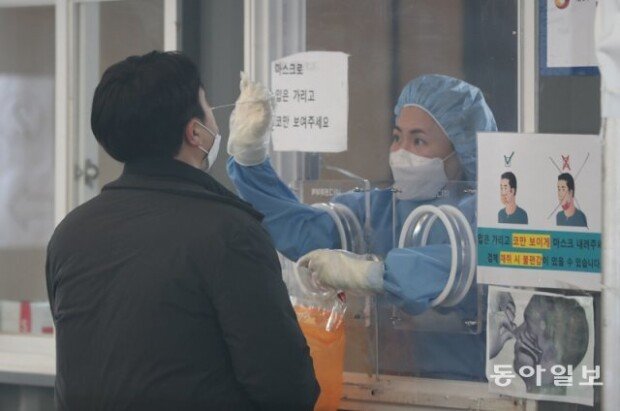Isolation period to be cut to 7 days when daily cases top 7,000
Isolation period to be cut to 7 days when daily cases top 7,000
Posted January. 15, 2022 07:46,
Updated January. 15, 2022 07:46

The system for Korea’s response to COVID-19 is set to change significantly, effective next week. With the spreading of the Omicron variant, which is two to three times more transmissible than Delta, the comprehensive process of epidemiological survey, isolation and treatment will change. The threshold of shifting in COVID-19 response that the quarantine authority suggests is ‘7,000 new daily cases, or the Omicron variant accounts for more than 50 percent of confirmed cases. Shown below is the new system for Korea’s response to COVID-19.
― I hear that if the new quarantine system is put in place, the availability of PCR tests will change.
“People who are epidemiologically linked to the disease, including those aged 65 and older, people with respiratory symptoms and people who had close contact with infected patients will be entitled to a (free) COVID-19 test. Also, people who test positive with rapid antigen test or those who test positive with a self-test kit for households will be eligible to receive a free COVID-19 test. We are discussing with relevant authorities about the level of payment that individuals will pay for the rapid test. The rapid antigen test brings about test results within 15 to 30 minutes, and thus is much faster the PCR test, which takes three to six hours, but offers less accurate test among other limitations.”
― I am unvaccinated. I hear that when using facilities requiring the vaccination pass, PCR test negativity as well as rapid antigen test negativity can be provided.
“That’s right. The government has decided to accept the results of the rapid antigen test that have been issued without the past 24 hours. However, only the rapid antigen test that was conducted by collecting sample from deep inside the nostril will be accepted. A self-test done by loosely touching inside the nostril by ordinary people will not be accepted.
― Currently a 61-year-old person is not eligible for the oral treatment ‘paxlovid.’ If the person gets infected with COVID-19, when will he or she be able to take the pill?
“If the response system shifts to the new system, people eligible to take the paxlovid pill will also be expanded. Since early supply of the drug is limited, the use of the drug is restricted only to people aged 65 and older and the immunocompromised. Going forward, the pill will be allowed for people aged 60 and older and patients with underlying health conditions including obesity, diabetes and cancer.”
― I hear that neighborhood clinics will be allowed to treat COVID-19 patients. Specifically, what kind of clinics will treat patients. Wouldn’t there be any risk of a COVID-19 patient transmitting the disease to other patients?
“There are ‘clinics for respiratory diseases’ across the nation designated previously by the Health and Welfare Ministry to treat patients with fever and respiratory illness. There are some 650 clinics, many of which are ear-nose-and-throat clinics. The government plans to let these clinics to treat COVID-19 patients first. Since it is possible to separate patients at these clinics and these facilities are equipped with negative-pressure chambers, the risk of further transmission is believed to be low. In the long-term, the government will agonize over ways to have internal medicine clinics and pediatric clinics to treat COVID-19.”
― I hear the duration of patient’s isolation and the process of epidemiological surveys will be simplified.
“That’s right. The duration of isolation required for a patient will decrease from 10 to seven days. The process of epidemiological surveys will also be simplified. Notably, a basic epidemiological survey that was conventionally conducted by the local public health center will switch to a method in which the confirmed patient will do by himself. That is, the patient will submit online one’s own personal profile, symptoms, and people who came into contact to the public health center.”
ksy@donga.com · asap@donga.com
Headline News
- Med professors announce intention to leave hospitals starting Thursday
- Bridge honoring Sgt. Moon Jae-sik unveiled in Pennsylvania
- Chief of Staff Chung tells presidential secretaries to stay away from politics
- US FTC bans noncompete agreements
- N. Korea launches cyberattacks on S. Korea's defense companies







